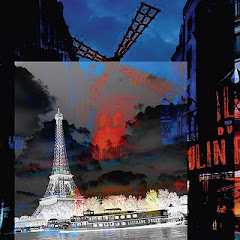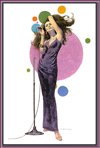Serge Gainsbourg (born Lucien Ginsburg, 1928 – 1991) was a French singer, songwriter, pianist, film composer, poet, painter, screenwriter, writer, actor and director. Regarded as one of the most important figures in French popular music, he was renowned for his often provocative and scandalous releases, as well as his diverse artistic output, which embodied genres ranging from jazz, mambo, world, chanson, pop and yé-yé, to rock and roll, progressive rock, reggae, electronic, disco, new wave and funk. Gainsbourg's varied musical style and individuality make him difficult to categorize although his legacy has been firmly established and he is often regarded as one of the world's most influential popular musicians.
His lyrical work incorporated a vast amount of clever word play to hoodwink the listener, often for humorous, provocative, satirical or subversive reasons. Common types of word play in his songs include mondegreen, onomatopoeia, rhyme, spoonerism, dysphemism, paraprosdokian and pun. Through the course of his career, Gainsbourg wrote over 500 songs, which have been covered more than a thousand times by a wide range of artists.
Born in Paris, France, Gainsbourg was the son of Russian Jewish emigrants who fled to Paris after the 1917 Russian Revolution. Joseph Ginsburg was a classically trained musician whose profession was playing the piano in cabarets and casinos; he taught his children, Gainsbourg and his twin sister Liliane, to play the piano.
Gainsbourg's childhood was profoundly affected by the occupation of France by Nazi Germany. The identifying “yellow star” Jews were mandated to wear became a symbol which haunted Gainsbourg and which in later years he was able to transmute into creative inspiration. During the Nazi occupation of World War II, the Jewish Ginsburg family was able to make their way from Paris to Limoges, traveling under false papers. Limoges was an unoccupied city, but under the administration of the collaborationist Vichy government and still a perilous refuge for Jews. At war’s end, Gainsbourg obtained work teaching music and drawing in a school outside of Paris, in Mesnil-Le-Roi. The school was set up under the auspices of local rabbis for the orphaned children of murdered deportees. Here Gainsbourg heard the accounts of Nazi persecution and genocide, stories that resonated for Gainsbourg far into the future. Before he was 30 years old, Gainsbourg was a disillusioned painter, but earned his living as a piano player in bars.
Gainsbourg changed his first name to Serge feeling that this was representative of his Russian background and because, as Jane Birkin relates: “Lucien reminded him of a hairdresser's assistant.” He chose Gainsbourg as his last name in homage to the English painter Thomas Gainsborough, whom he admired.
In late 1967 he had a short but ardent love affair with Brigitte Bardot, to whom he dedicated the song and album Initials BB.
In mid-1968 Gainsbourg fell in love with the younger English singer and actress Jane Birkin, whom he met during the shooting of the film Slogan. Their relationship lasted over a decade. Birkin left Gainsbourg in 1980.
Birkin remembers the beginning of her affair with Gainsbourg: he first took her to a nightclub, then to a transvestite club and afterwards to the Hilton hotel, where he passed out in a drunken stupor.
His last partner was Bambou (Caroline Paulus, grandniece of Field marshal Friedrich Paulus). His early songs were influenced by Boris Vian and were largely in the vein of old-fashioned chanson. Very early, however, Gainsbourg began to move beyond this and experiment with a succession of musical styles: jazz early on, pop in the 1960s, funk, rock and reggae in the 1970s, and electronica in the 1980s.
By the time the yéyés arrived to France, Gainsbourg was 32 years old and was not feeling very comfortable: he spent much time with Jacques Brel or Juliette Gréco, but the public and critics rejected him, mocking his prominent ears and nose. During this period, Gainsbourg began working with Gréco, a collaboration that lasted throughout the 'Left Bank' period culminating in the song 'La javanaise' in the fall of 1962.
He performed a few duets in 1964 with the artist Philippe Clay, with whom he shared some resemblance.
More success began to arrive when, in 1965, his song "Poupée de cire, poupée de son" was the Luxembourg entry in the Eurovision Song Contest. Performed by French teen and charming singer France Gall, it won first prize. The song was recorded in English as "A Lonely Singing Doll" by British teen idol Twinkle.
His next song for Gall, "Les Sucettes" ("Lollipops"), caused a scandal in France: Gainsbourg had written the song with double-meanings and strong sexual innuendo, of which the singer was apparently unaware when she recorded it. Whereas Gall thought that the song was about a girl enjoying lollipops, it was really about oral sex. The controversy arising from the song, although a big hit for Gall, threw her career off-track in France for several years.
Gainsbourg arranged other Gall songs and LPs that were characteristic of the late 1960s psychedelic styles, among them Gall's 1968 album.
He also wrote hit songs for other artists, such as "Comment te dire adieu" for Françoise Hardy.
In 1969, he released "Je t'aime... moi non plus", which featured explicit lyrics and simulated sounds of female orgasm. The song appeared that year on an LP, Jane Birkin/Serge Gainsbourg. Originally recorded with Brigitte Bardot, it was released with future girlfriend Birkin when Bardot backed out. While Gainsbourg declared it the "ultimate love song," it was considered too "hot"; the song was censored or banned from public broadcast in numerous countries, and in France even the toned-down version was suppressed. The Vatican made a public statement citing the song as offensive. However, despite or perhaps because of all the controversy, it sold well and charted within the top ten in many European countries.
Histoire de Melody Nelson was released in 1971. This concept album, produced and arranged by Jean-Claude Vannier, tells the story of a Lolita-esque affair, with Gainsbourg as the narrator. It features prominent string arrangements and even a massed choir at its tragic climax. In 1975, he released the album Rock Around the Bunker, a rock album written entirely on the subject of the Nazis. Gainsbourg used black comedy, as he and his family suffered during World War II. While a child in Paris, Gainsbourg had worn the yellow badge as the mark of a Jew. Rock Around the Bunker belonged in the mid-1970s "retro" trend.
The next year saw the release of another major work, L'homme à tête de chou (Cabbage-Head Man), featuring the new character Marilou and sumptuous orchestral themes. Cabbage-Head Man is one of his nicknames, as it refers to his ears. Musically, L'homme à tête de chou turned out to be Gainsbourg's last LP in the English rock style he had favoured since the late 1960s. He would go on to produce two reggae albums recorded in Jamaica (1979 and 1981) and two electronic funk albums recorded in New York (1984 and 1987).
In Jamaica in 1979, he recorded "Aux armes et cætera", a reggae version of the French national anthem "La marseillaise". Following harsh and anti-semitic criticism in right-wing newspaper Le Figaro by Charles de Gaulle biographer Michel Droit, his song earned him death threats from right-wing veteran soldiers of the Algerian War of Independence who were opposed to their national anthem being arranged in reggae style. In 1979, a show had to be cancelled because an angry mob of French Army parachutists came to demonstrate in the audience. Alone onstage, Gainsbourg rose his fist and answered "The true meaning of our national anthem is revolutionary" and sung it with the audience. The soldiers joined them, a scene enjoyed by millions as French TV news broadcast it, creating more publicity. Shortly afterward, Gainsbourg bought the original manuscript of "La marseillaise". He replied to his critics that his version was, in fact, closer to the original as the manuscript clearly shows the words "Aux armes et cætera..." for the chorus. This fine album was his biggest commercial success. Rita Marley and the I-Three would record another controversial reggae album with him in 1981, Mauvaises nouvelles des étoiles. Bob Marley was furious when he discovered that Gainsbourg made his wife Rita sing erotic lyrics.
After a turbulent 13-year-long relationship, Jane Birkin left Gainsbourg. In the 1980s, near the end of his life, Gainsbourg became a regular figure on French TV. His appearances seemed devoted to his controversial sense of humour and provocation. In March 1984, he burned three-quarters of a 500 French franc bill on television to protest against taxes raising up to 75% of income.
He would show up drunk and unshaven on stage: in April 1986, in Michel Drucker's live Saturday evening show with the American singer Whitney Houston, he objected to Drucker's translating his comments to Whitney Houston and in English stated: "I said, I want to fuck her" - Drucker insisted this meant "He says you are great..."
His songs became increasingly eccentric during this period, ranging from the anti-drug "Aux enfants de la chance" to the highly controversial duet with his daughter Charlotte named "Lemon Incest". This translates as "Inceste de citron", a wordplay on "un zeste de citron" (a lemon zest). The title demonstrates Gainsbourg's love for puns – another example of which is "Beau oui comme Bowie", a song he gave to actress Isabelle Adjani.
During his final years, he released Love on the Beat, a controversial electronic album with mostly sexual themes in the lyrics, and his last studio album, You're Under Arrest, presented more synth-driven songs.
Gainsbourg appeared in nearly 50 film and television roles. In 1960, he co-starred with Rhonda Fleming in the Italian film La Rivolta Degli Schiavi (The Revolt of the Slaves) as Corvino, the Roman Emperor Massimiano's evil henchman. In 1969, he appeared in William Klein's pop art satire Mister Freedom, and in the same year he starred with Jane Birkin in Les chemins de Katmandou (The Pleasure Pit). He also made a brief appearance with Birkin in Herbert Vesely's 1980 film, Egon Schiele Exzess und Bestrafung. He co-starred alongside Birkin in the French movie Slogan, for which he wrote the title song "La chanson de slogan". Also with Birkin, he acted in the French-Yugoslavian film Devetnaest djevojaka i jedan mornar (19 girls and one sailor), where he had a role of a partisan man.
Gainsbourg directed five movies: Je t'aime ... moi non plus, Le Physique et le Figuré, Équateur, Charlotte for Ever, and Stan the Flasher.
Throughout his career, Gainsbourg wrote the soundtracks for nearly 60 films and television programs. In 1996, he received a posthumous César Award for Best Music Written for a Film for Élisa, along with Zbigniew Preisner and Michel Colombier.
Gainsbourg died on 2 March 1991 of a heart attack. He was buried in the Jewish lot of the Montparnasse Cemetery, in Paris. His funeral brought Paris to a standstill, and French President François Mitterrand said of him, "He was our Baudelaire, our Apollinaire... He elevated the song to the level of art." His home at the well-known address 5bis, rue de Verneuil is still covered in graffiti and poems.
Since his death, Gainsbourg's music has reached legendary stature in France. He has also gained a following in the English-speaking world, with numerous artists influenced by his arrangements. One of the most frequent interpreters of Gainsbourg's songs was British singer Petula Clark, whose success in France was propelled by her recordings of his tunes. In 2003, she wrote and recorded La chanson de Gainsbourg as a tribute to the composer of some of her biggest hits. The majority of Gainsbourg's lyrics are collected in the volume Dernières nouvelles des étoiles.
One of the celebrating events of the Year of France in Brazil was a concert in September 2009 called "Gainsbourg Imperial", an event celebrating the music of Serge Gainsbourg. It was performed by Brazilian Samba Big Band Orquestra Imperial, having French maestro Jean-Claude Vannier, English singer Jane Birkin and Brazilian musician and singer Caetano Veloso as special guests.
Enjoy Serge Gainsbourg's style!
Ballade de Melody Nelson
Élisa
Initials BB
Je suis venu te dire que je m'en vais
L'eau à la bouche
La chanson de Prévert
La javanaise
Requiem pour un con
Sous le soleil exactement













No comments:
Post a Comment